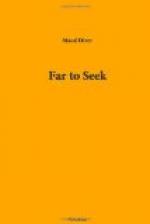And there was yet a third Delhi, hard by these two; yet curiously aloof: official, Anglo-Indian Delhi, of bungalows and clubs and painfully new Government buildings. Little scope here for imaginative excursions, but much scope for thought in the queer sensation, that beset him, of seeing his father’s people, as it were, through his mother’s eyes.
New as he was to Anglo-Indian life, these glimpses from the outskirts were sufficiently illuminating. Once he was present in the crowd at a big Gymkhana; and more than once he strolled through the Club gardens where social Delhi pursued tennis-balls and shuttle-cocks—gravely, as if life hung on the issue; or gaily, with gusts of laughter and chaff, often noisier than need be. And he saw them all, now, from a new angle of vision. Discreetly aloof, he observed, in passing, the complete free-and-easiness of the modern maiden with her modern cavalier; personalities flying; likewise legs and arms; a banter-wrangle interlude over a tennis-racquet; flight and pursuit of the offending maiden, punctuated with shrieks, culminating in collapse and undignified surrender: while a pair of club peons—also discreetly aloof—exchanged remarks whose import would have enraged the unsuspecting pair. Roy knew very well they never gave the matter a thought. They were simply ‘rotting’ in the approved style of to-day. But, seen from the Eastern standpoint, the trivial incident troubled him. It recalled a chance remark of his grandfather’s: “With only a little more decorum and seriousness in their way of life out here, they could do far more to promote good understanding socially between us all, than by making premature ‘reforms’ or tilting at barriers arising from opposite kinds of civilisation.”
Here was matter for the novel—or novels—to be born of his errantry:—the ‘fruit of his life’ that she had so longed to bold in her hands. Were she only at Home now, what letters-without-end he would be pouring out to her! What letters he could have poured out to Aruna—did conscience permit.
He allowed himself two, in the course of ten days; and the spirit moved him, after long abstention, to indulge in a rambling screed to Tara telling of his quest; revealing more than he quite realised of the inner stress he was trying to ignore. The quest, he emphasised, was a private affair, confided to her only, because he knew she would understand. It hurt more than he cared to admit to feel how completely his father would not understand his present turmoil of heart and brain....
Isolated thus, with his hidden thwarted emotion, there resulted a literary blossoming, the most spontaneous and satisfying since his slow struggle up from the depths. Alone at night, and in the clear keen dawns, he wrote and wrote and wrote, as a thirsty man drinks after a desert march:—poems chiefly; sketches and impressions; his dearest theme the troubled spirit of India,—or was it the spirit of




